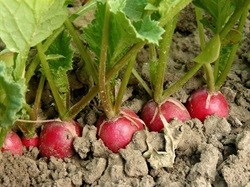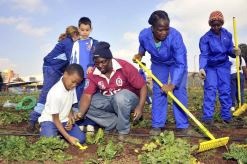Discussions about the regeneration of Johannesburg's inner city usually revolve around refurbishment of buildings and attracting business and residents into the city. But an award-winning project in downtown Johannesburg with the ambitious long-term aim of feeding poor people in the inner city is changing the conversation.

© DLeonis - Fotolia.com
Urban farming has taken root in the run-down suburb of Betrams, as part of a municipal programme to revitalise the city. The Bambanani Food and Herb Garden has reclaimed the abandoned bowling greens of the old Bertrams Bowling Club, once a recreation centre reserved for white people during the apartheid era. Now, the lawns have been turned over, furrows tilled, soil fertilised, and vegetables planted and harvested.
Earlier in November 2013 the project won the Mma Tshepo Khumbane Award, from the Gauteng Department of Agriculture and Rural Development, for the best community-based natural resources management project in the province. Khumbane is a grassroots activist and the founder of the Water for Food Movement, which works in rural Gauteng. For 40 years she has tried to fight malnutrition and hunger by encouraging small-scale farming.
'No need to go hungry'
The brim of Maria Maseko's hat shades her eyes from the afternoon sun: it's cloudless summer day with temperatures pushing into the 30s. One of the original volunteers at the Bambanani project, she takes in the familiar view of the dramatic Johannesburg skyline, with the iconic concrete tube of the Ponte Tower, and Ellis Park Stadium. "There is no need for anyone to ever go to bed hungry in Betrams, not when there is access to healthy affordable food right on their doorstep," she says.
Bambanani is just one of a number of art, sport and agriculture projects in downtown Johannesburg that are changing the way Joburgers experience their city. The garden is part of what is called Hope Village, a redevelopment project that includes a cricket oval and recreation centre for the kids of Bertrams and Hillbrow.
Started with a R21,000 grant from the city in 2006 for seed and tools and the efforts of a group of 10 volunteers, the garden supplies cheap organic vegetables to the local community, and sells to street hawkers and the Bertrams Spar supermarket. The generosity of sponsors such as Talborne Organics and Jojo Tanks and the passion of people like Maseko and fellow volunteer Amon Maluleke has kept the project growing.
Food and memory
"We dug up the lawn and planted our first crop by hand," says Maseko, who recently retired from Johannesburg's Department of Social Development. "It was hard, backbreaking work but it's a crucial part of the creation of a diverse ecosystem and an important bonding tool for the local community."
The gardeners use the companion planting method and their harvests are Participatory Guarantee Systems certified as organic. This allows the cooperative to also sell their products at local organic markets.

Working on the food garden helps build a sense of community among the people living in Bertrams. Many of them, people who have moved to Johannesburg from rural areas, have the skills and knowledge to work the land. (Image: Bambanani Food and Herb Garden)
"We grow our tomatoes next to our basil. This gives the tomatoes a rich taste, but more importantly the basil protects the plants from insects," Maseko explains. She pulls a head of kale, known as shiyama to most Africans, out of the ground. It is a deep green and fills both her palms. It sells at the garden for R15 a head; at a supermarket it's R30.
As the suburb declined over the years, the Bertrams Bowling Club, the site of the garden, fell into disuse. The City of Johannesburg decided its two bowling greens would be better used to grow vegetables. The gardeners now produce an astonishing variety of vegetables, potatoes, sweet potatoes, cabbage, chillies, spinach, kale, onions and butternut. The once-fallow plot is now a bright green space, filled with activity and colour.
"This Congolese man brought us seeds indigenous to the Congo," Maseko says. "He wanted us to plant them so he could he have a taste of home here. Those are the memories food can evoke."
'They know how to work the land'
Bertrams, and Johannesburg, offers a collection of stunning architecture and museums but to a transplant like Amon Maluleke, from rural Limpopo, the city lacked green space that would allow people with the skills to farm vegetables. "People come to the city and want to work in a job where they wear a tie but they don't have the skills," he says. "Like me they know how to work the land, they can feed themselves, they can feed their neighbours if they were given the space and the opportunity."
Maluleke came upon the inner city farm in July 2007 after he had been retrenched. He is now assistant groundskeeper at the adjacent cricket oval, home to the Johannesburg Cricket Club, and is studying towards a degree in ornamental horticulture.
Bambanani also serves as a gardening academy, training nursery school staff from across the city in the art of vegetable gardening. Across Bertrams school grounds that would have been planted with flowers are now being turned into fertile corners bursting with freshly grown fruit and vegetables. These are, in part, driven by need, but spurred on by the efforts of the volunteers at Bambanani.
"In the beginning the idea behind Bambanani was regeneration of the neighbourhood and to improve the health of its residents by making fresh organic fruit and vegetables available to them," says Maluleke. "It's taken hold of people's imaginations. They see the importance of fresh, healthy food and the need for green, working space in the city."
Garden suburb, then and now
Originally built as a suburb for the professional classes, Bertrams abuts Old Doornfontein, the preferred neighbourhood for the city's wealthy entrepreneurial classes in the early days of Johannesburg. Today it's a suburb in transition with a multicultural population of South Africans and African refugees building a vibrant community of small businesses and sports clubs.
Bertrams can lay claim to some famous past residents. Robert Baden Powell, the founder of the Boy Scouts, and colonial magnate Cecil John Rhodes lived on the ridge that today overlooks Ellis Park Stadium. Infamous serial poisoner Daisy de Melker did her misdeeds in the suburb. When it was incorporated into the city in 1897 Bertrams was known for its gardens and stables housing thoroughbred horses. Today it's a part of the city most people race through with car windows closed and doors locked.
What they miss as they speed through the neighbourhood is how the area is becoming a place of fecundity again. On the surface it seems to be on the brink of ecological and social collapse, but if you look closely you will see the green shoots of abundance.
































